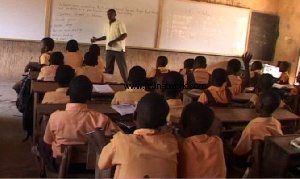Opinions of Monday, 4 September 2017
Columnist: Okota-Wilson Nicholas
Correcting the societal miscommunication on social studies in basic schools
The teaching and learning of Social Studies in Ghana is gradually losing its essence in the basic school. The picture is painted as if even without a teacher, pupils can read it on their own, write exams and pass. It is no wonder that less attention and time is given to the teaching and learning of the subject.
It becomes terribly worrying if not disturbing when teachers of other subjects start talking ill and pass disregarding comments about Social Studies, that it is of no importance to national development and irrelevant to pupils as they further their education from the basic school to the second cycle institutions.
This explains why when pupils are preparing towards writing the Basic Education Certificate Examination, much of their attention, focus and time will be on only English Language, Mathematics and Integrated Science. But Social Studies should not be treated in such manner.
The teaching of Social Studies in the basic school should go beyond just writing and passing examination to tackling and dealing with the issue of preparing pupils to fit into the society properly even if the child might not be able to further his or her formal education.
The rationale for teaching Social Studies as captured in the teaching syllabus used in the basic school is to prepare the individual (learner) to fit into the society by equipping him or her with the knowledge about the culture and ways of life of the society, its problems, its values and its hopes for the future. That is why scholars comfortably opine that, the main aim of Social Studies is citizenship education.
The subject looks at and seeks to develop the learner holistically so that he or she becomes useful and active player in the society. The subject equips the student with knowledge of the past, present and possible future trends. It exposes pupils to the problems in and of the society and provides them with the necessary knowledge and competencies to deal with them.
It is also a subject to help the learner to develop critical thinking skills and values desired by the society. This is clearly shown by the profile dimension- which is the underlying behaviours for teaching, learning and assessment- for teaching the subject at the junior high school. The percentage weights for the various dimensions are: 25% for knowledge and understanding, 25% for use or application of knowledge and 50% for attitudes and values.
From the dimensions, the subject does not fully focus on just acquisition and reproducing knowledge but it is very much interested in helping pupils to develop positive attitudes and values. It is only Social Studies that places much emphasis on the attitude and values pupils are to develop and put them to effective use.
To achieve this, how the subject is taught will play a critical role. Unfortunately, the impression is created that, just any teacher with respect to one’s area of specialisation can teach Social Studies. Headteachers do not inquire the background of a teacher even before assigning him or her the subject to teach.
This has led to the situation where most teachers handling Social Studies are adopting the ‘ notes explanation’ approach. This is the situation where teachers start the lesson by writing notes from a textbook or pamphlet on the chalkboard for pupils to copy. It is after the copying of the notes that the teacher will do an explanation which follows swiftly with giving pupils exercise.
In most cases, the teacher using this method does not make the necessary preparation before the lesson. When this happens, the pupil does not get the actual essence of the lesson. The teaching syllabus designed for the teaching of the subject suggests the use of relevant resource persons and people with real life experience needed to understand the lesson. The teacher must not employ teacher-centred techniques which will make the learner passive in the class.
The learner must be actively engaged during the Social Studies lesson. It should not be just copying and explaining notes. There is the need to avoid rote learning and drill oriented methods in Social Studies. It becomes no surprise that after completing the junior high school, a student cannot identify his south or north relative to a position.
Social Studies should be used to help pupils to develop values and seek for the collective welfare of the society. Social Studies teachers should not keep pupils writing extensive notes from textbooks; they should help students to make practical, concepts they learn, through case study, role play, field trips, etc. The right teachers with the right training and specialization must be given the subject to teach. All the subjects taught in the basic school are useful and relevant to the development of the society.
The only problem is how they are taught. Teachers and the society in general must take keen interest in the behaviour and kind of life the learner will live with the kind of subjects being taught in the schools rather than just preparing them for exams. Attitude is key to the development of the society. A child’s acquisition of knowledge without the right attitude will not serve the society well and that is where Social Studies comes in.













